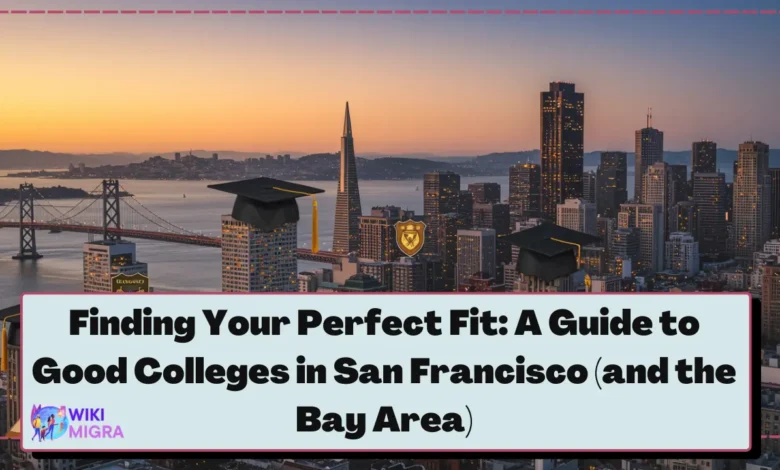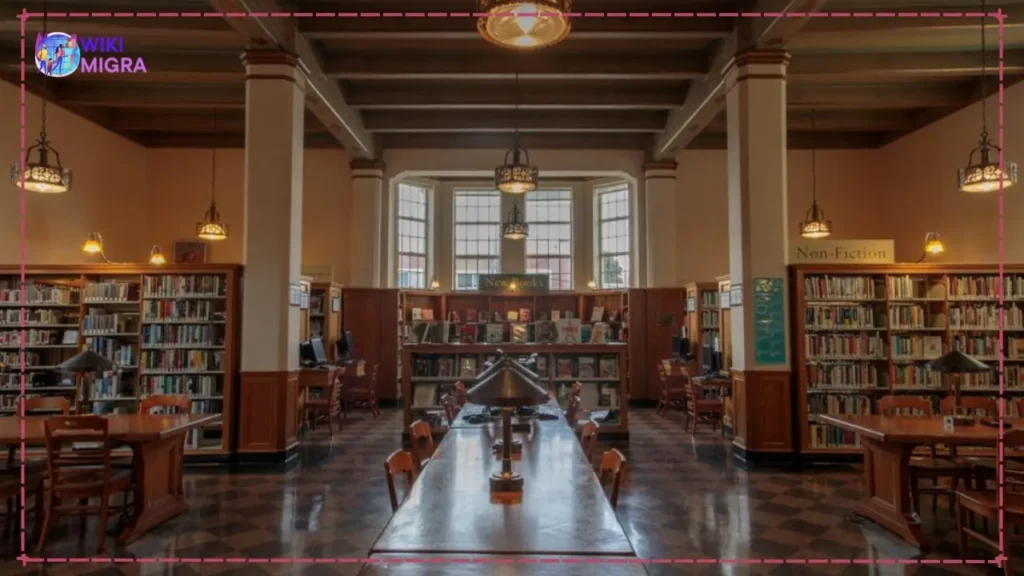Finding Your Perfect Fit: A Guide to Good Colleges in San Francisco (and the Bay Area)

San Francisco. The name alone conjures images of the iconic Golden Gate Bridge piercing through the fog, cable cars climbing impossibly steep hills, vibrant neighborhoods buzzing with energy, and a spirit of innovation that has reshaped the world. It’s a city that pulses with culture, opportunity, and a unique California cool. For prospective students, the idea of studying here is incredibly appealing – access to world-class industries, diverse communities, and an unforgettable urban experience. But let’s be real: San Francisco also presents challenges, most notably its high cost of living. Finding good colleges in San Francisco involves balancing academic ambition with practical realities.
So, what does “good” really mean when we talk about colleges in this dynamic city? It’s not just about rankings (though we’ll touch on those). It’s about finding the right fit – considering academic reputation, the strength and relevance of specific programs (especially those tapping into SF’s thriving economy), campus culture, location within the city, and ultimately, post-graduation outcomes. This guide dives deep into the landscape of higher education directly within San Francisco, covering major 4-year universities (both public and private), leading specialized institutions, and the city’s vital community college. We’ll also briefly look at two powerhouse universities nearby in the Bay Area that often draw students considering the region.
To compile this list, we’ve considered factors like academic standing (referencing reputable sources and data), program offerings tailored to local industries, student life elements, and geographic accessibility, aiming for a data-driven yet nuanced perspective. Let’s explore the options and help you find your good college in San Francisco.
Understanding San Francisco for Students: More Than Just a Postcard
Before diving into specific institutions, it’s crucial to understand the city itself. San Francisco is geographically small (just 49 square miles) but incredibly dense and diverse. Each neighborhood has its own distinct character, from the Haight-Ashbury’s counter-culture history to the Mission’s vibrant Latino roots and murals, the Financial District’s skyscrapers, and the Marina’s waterfront views.
Key Industries & Opportunities: SF is a global hub for:
- Technology: Silicon Valley’s influence permeates the city, with countless startups and established tech giants offering internships and career paths.
- Biotechnology & Health Sciences: Driven by institutions like UCSF and numerous biotech companies in the Bay Area.
- Arts & Culture: World-class museums, galleries, theaters, and music venues thrive here, supporting renowned art schools in San Francisco.
- Finance: The city remains a major financial center on the West Coast.
- Tourism & Hospitality: A cornerstone of the local economy.
Transportation: Getting around without a car is feasible, thanks to Muni (buses, light rail, historic streetcars, cable cars) and BART (Bay Area Rapid Transit) connecting SF to the East Bay and Peninsula. However, navigating the system effectively takes some getting used to.
The Elephant in the Room: Cost of Living for SF Students
There’s no sugarcoating it: San Francisco is one of the most expensive cities in the United States. This significantly impacts students.
- Housing: On-campus housing is often limited and competitive. Off-campus rent is extremely high, with shared apartments being the norm. Expect monthly rent for a room to range from $1,500 to $2,500+, depending on the neighborhood and amenities.
- Daily Expenses: Food, transportation, and entertainment costs are also well above the national average.
- Financial Planning: Prospective students must factor the high cost of living sf student reality into their budget. Thoroughly research financial aid packages, scholarships (both institutional and external), part-time work opportunities, and low-cost living strategies. Ignoring this factor can lead to significant stress.
Understanding these aspects provides essential context for choosing a college that fits both your academic goals and your financial capabilities.
You may be interested in: San Francisco Top Universities: The Ultimate Guide (2025)
Top 4-Year Universities Directly in San Francisco

These universities offer a broad range of undergraduate and often graduate programs right within the city limits.
University of San Francisco (USF)
- Overview: A private Jesuit Catholic university known for its commitment to social justice, diverse student body, and beautiful campus. Medium-sized (~10,000 students total, ~6,000 undergrad). Offers a liberal arts education with strong professional programs. Considered one of the top private colleges sf.
- Key Stats (Approx. & Subject to Change – Check Official Sources):
- Acceptance Rate: ~71% (Fall 2023)
- Avg. Undergrad Tuition & Fees: ~$58,000 (2024-2025)
- Popular Majors: Business Administration, Nursing, Psychology, Biology, Communication Studies.
- Academic Strengths: Strong programs in Business (nationally ranked), Nursing (highly regarded), Law, International Studies, and Environmental Science. Emphasis on community-engaged learning and global perspectives.
- Campus & Location: USF boasts a stunning, hilly 55-acre campus (“The Hilltop”) adjacent to Golden Gate Park, offering incredible city views. Located between the Inner Richmond and Haight-Ashbury neighborhoods, it provides relatively easy access to various parts of the city. The area feels residential and generally safe, though standard urban precautions apply.
- Student Life Snippet: Active student life with over 100 clubs and organizations. Strong focus on diversity and inclusion. NCAA Division I athletics (Dons). Residential life is central to the freshman experience.
- Website: University of San Francisco Admissions
San Francisco State University (SFSU)
- Overview: A large public university, part of the California State University (CSU) system. Known for its diverse student population, strong commitment to social justice, and wide range of practical, career-oriented programs. Large size (~25,000 students total, ~22,000 undergrad). A cornerstone of public colleges sf.
- Key Stats (Approx. & Subject to Change – Check Official Sources):
- Acceptance Rate: ~94% (Fall 2023 – Note: CSUs have specific eligibility indices)
- Avg. Undergrad Tuition & Fees (2024-2025): ~
7,500(CAResident), 7,500(CAResident),19,400 (Non-Resident) – Significantly more affordable for in-state students. - Popular Majors: Business Administration, Psychology, Cinema, Biology, Communication Studies, Liberal Studies (for educators).
- Academic Strengths: Renowned programs in Cinema (boasting famous alumni), Creative Writing, Ethnic Studies (home to the first College of Ethnic Studies in the nation), Education, and Social Work. Strong connections to local industries for internships.
- Campus & Location: SFSU’s main 144-acre campus is located in the southwestern corner of the city, near Lake Merced. It has a more traditional, somewhat sprawling campus feel compared to USF. The neighborhood is largely residential and relatively quiet. Accessible via Muni light rail and buses.
- Student Life Snippet: Very diverse student body reflecting the Bay Area’s demographics. Commuter-heavy, but with active clubs, Greek life, and NCAA Division II athletics (Gators). Offers on-campus housing options.
- Website: San Francisco State University Admissions
California College of the Arts (CCA)
- Overview: A leading private, non-profit art school in San Francisco, focused on art, design, architecture, and writing. Known for its interdisciplinary approach and strong ties to the creative industries. Medium-sized (~1,600 students).
- Key Stats (Approx. & Subject to Change – Check Official Sources):
- Acceptance Rate: ~76% (Fall 2023)
- Avg. Undergrad Tuition & Fees: ~$57,000 (2024-2025)
- Popular Majors: Graphic Design, Illustration, Animation, Painting/Drawing, Industrial Design, Architecture.
- Academic Strengths: Highly ranked programs across various art and design disciplines. Emphasis on critical theory, studio practice, and making. Faculty are practicing artists and designers. Strong focus on sustainability and social impact in design.
- Campus & Location: CCA consolidated its operations onto its expanded San Francisco campus in the Potrero Hill / Mission Bay neighborhood. This purpose-built campus features state-of-the-art studios, labs, and galleries. The location is close to design studios, tech companies, and cultural institutions, offering excellent internship potential.
- Student Life Snippet: Creative, collaborative, and studio-intensive environment. Diverse student body from around the world. Focus is heavily on artistic development and professional practice. Offers some campus housing.
- Website: California College of the Arts Admissions
Academy of Art University
- Overview: A large, private, for-profit art school in San Francisco. Offers a wide array of programs in art, design, fashion, animation, game development, and more. Known for its open admissions policy for undergraduate programs and focus on practical skills for creative careers. Very large enrollment across online and on-site programs.
- Key Stats (Approx. & Subject to Change – Check Official Sources):
- Acceptance Rate: Open admission for undergraduate programs (requires HS diploma/GED). Graduate programs have specific requirements.
- Avg. Undergrad Tuition & Fees: ~$28,000 – $30,000 (2024-2025 estimate, often priced per unit/semester). Verify specific program costs.
- Popular Majors: Animation & Visual Effects, Game Development, Graphic Design, Fashion, Illustration, Motion Pictures & Television.
- Academic Strengths: Strong emphasis on industry-standard software and techniques. Faculty are often working professionals. Extensive range of specialized creative programs. Offers NCAA Division II athletics.
- Campus & Location: Unlike traditional campuses, Academy of Art University owns numerous buildings scattered throughout downtown San Francisco and other neighborhoods. This urban campus model integrates students directly into the city fabric. Commuting between buildings is common.
- Student Life Snippet: Focus is heavily on portfolio development and career preparation. Large commuter population, but offers student housing and clubs. Diverse student body, including many international students.
- Website: Academy of Art University Admissions
Golden Gate University (GGU)
- Overview: A private, non-profit university primarily focused on professional studies in business and law, catering often to working adults and graduate students, though it offers some undergraduate programs. Smaller size (~3,000 students).
- Key Stats (Approx. & Subject to Change – Check Official Sources):
- Acceptance Rate: Varies by program; generally accessible for qualified applicants.
- Avg. Undergrad Tuition & Fees: ~$17,000 – $20,000 (2024-2025 estimate, often per unit). Graduate/Law tuition differs significantly.
- Popular Areas: Business Administration (various concentrations), Accounting, Taxation, Law (JD, LLM).
- Academic Strengths: Strong reputation in Taxation and Accounting. Law school is well-regarded locally. Programs designed with practical application and career advancement in mind, often with flexible schedules (evening/online). Close ties to the downtown business and legal communities.
- Campus & Location: Located right in the heart of the Financial District. The campus consists primarily of a few academic buildings. This location is ideal for internships and networking in business and law firms. Primarily a commuter campus.
- Student Life Snippet: Geared towards working professionals and graduate students. Less emphasis on traditional undergraduate campus life, more on networking and professional development.
- Website: Golden Gate University Admissions
Leading Specialized & Graduate Institutions in SF

These institutions are powerhouses in their specific fields, primarily serving graduate and professional students.
University of California, San Francisco (UCSF)
- Overview: Part of the prestigious University of California system, UCSF is unique because it is exclusively focused on graduate-level health sciences education and biomedical research. It has no undergraduate programs. It’s consistently ranked among the top medical and health science centers globally. Public institution.
- Key Stats (Approx. & Subject to Change – Check Official Sources):
- Acceptance Rate: Extremely competitive across all programs (e.g., Medical School often < 3-4%).
- Avg. Tuition & Fees: Varies significantly by program (Medicine, Nursing, Dentistry, Pharmacy, Graduate Division). Check specific school/program. CA residency offers lower tuition.
- Schools/Programs: Medicine, Nursing, Dentistry, Pharmacy, Graduate Division (PhD, Masters in biomedical sciences).
- Academic Strengths: World-renowned research and clinical training across all health science fields. Leading hospital system (UCSF Health). Major hub for biomedical innovation and discovery.
- Campus & Location: UCSF has several major sites, including the main Parnassus Heights campus (overlooking Golden Gate Park), Mission Bay (a modern hub for research and clinical care), and Mount Zion. Each location houses different schools, research labs, and hospitals.
- Student Life Snippet: Rigorous, research-intensive, and clinically focused environment. Students are highly driven and dedicated to health sciences. Strong sense of community within specific schools/programs.
- Website: UCSF Admissions (Portal to different schools)
University of California College of the Law, San Francisco (Formerly UC Hastings)
- Overview: Renamed in 2023, UC Law SF is the oldest law school in the UC system and a prominent public institution focused solely on legal education. Located directly in San Francisco.
- Key Stats (Approx. & Subject to Change – Check Official Sources):
- Acceptance Rate: Competitive (~25-30% for JD program, varies yearly).
- Avg. Tuition & Fees (JD): ~
50,000(CAResident), 50,000(CAResident),59,000 (Non-Resident) (2024-2025 estimate). - Programs: Juris Doctor (JD), Master of Laws (LLM), Master of Studies in Law (MSL).
- Academic Strengths: Strong programs in Litigation and Dispute Resolution, Intellectual Property, International Law, and Public Interest Law. Excellent location near courts and government offices provides practical opportunities. Diverse faculty and student body.
- Campus & Location: Urban campus located in the Civic Center / Tenderloin area. Comprises several academic and administrative buildings, including a modern academic village with housing. Proximity to federal and state courts is a major advantage.
- Student Life Snippet: Intense, academically demanding law school environment. Strong focus on practical skills training (clinics, externships). Active student organizations and journals.
- Website: UC Law SF Admissions
San Francisco Conservatory of Music (SFCM)
- Overview: A premier private music conservatory offering undergraduate and graduate degrees in music performance, composition, and conducting. Known for its rigorous training and connection to the city’s vibrant music scene. Small size (~500 students).
- Key Stats (Approx. & Subject to Change – Check Official Sources):
- Acceptance Rate: Highly competitive, requires audition (~30-40%).
- Avg. Undergrad Tuition & Fees: ~$54,000 (2024-2025).
- Programs: Instrumental Performance, Voice, Composition, Conducting, Technology and Applied Composition (TAC), Roots, Jazz, and American Music (RJAM).
- Academic Strengths: World-class faculty, many drawn from the San Francisco Symphony and Opera. State-of-the-art performance facilities in the Bowes Center. Strong emphasis on performance excellence and career development. Innovative programs blending technology and music.
- Campus & Location: Located in the Civic Center area, close to Davies Symphony Hall and the War Memorial Opera House. The Ute and William K. Bowes, Jr. Center for Performing Arts is a landmark building with housing, dining, and performance spaces.
- Student Life Snippet: Immersive, performance-focused environment. Intense practice schedules. Collaborative atmosphere among talented musicians. Numerous performance opportunities.
- Website: SFCM Admissions
California Institute of Integral Studies (CIIS)
- Overview: A private, non-profit university known for its unique, non-traditional approach integrating psychology, spirituality, philosophy, and cultural studies. Focuses primarily on graduate programs, with a few undergraduate degree completion options.
- Key Stats (Approx. & Subject to Change – Check Official Sources):
- Acceptance Rate: Varies by program, generally requires alignment with the institute’s mission.
- Avg. Tuition & Fees: Varies significantly by program (Check specific program).
- Popular Areas: Counseling Psychology (various specializations like Somatic, Drama Therapy, Community Mental Health), Integral & Transpersonal Psychology, Philosophy & Religion, Anthropology & Social Change.
- Academic Strengths: Pioneer in integral education, transpersonal psychology, and consciousness studies. Offers unique programs not found elsewhere. Emphasis on experiential learning, social justice, and holistic perspectives.
- Campus & Location: Located in the South of Market (SoMa) / Mission District area. Operates out of a main academic building. Commuter focused.
- Student Life Snippet: Attracts a diverse group of students interested in personal growth, social change, and alternative perspectives. Strong sense of community within cohorts. Focus on workshops, lectures, and specialized training.
- Website: CIIS Admissions
You may be interested in: Online Business Management Degree Programs Accredited 2025
Excellent Community College Option in SF

For affordability, transfer pathways, and vocational training, community colleges are essential.
City College of San Francisco (CCSF)
- Overview: A large, comprehensive public community college serving San Francisco. Offers associate degrees, certificate programs, and transfer pathways to four-year universities (especially UCs and CSUs). Known for its diverse student body and wide range of offerings. One of the key community colleges sf bay area.
- Key Stats (Approx. & Subject to Change – Check Official Sources):
- Acceptance Rate: Open admission policy for California residents.
- Avg. Tuition & Fees: Highly affordable, especially for SF residents (currently offers Free City tuition program for residents meeting criteria). Standard CA community college fee is $46/unit (check current rates and residency rules). Out-of-state tuition is higher.
- Popular Areas: Liberal Arts (for transfer), Business, Health Care (Nursing, EMT), Culinary Arts & Hospitality, Engineering Tech, Child Development.
- Academic Strengths: Excellent transfer preparation programs (TAG agreements with UCs). Strong vocational and career technical education (CTE) programs aligned with local job markets. ESL and basic skills education are vital services. Committed faculty.
- Campus & Location: CCSF has multiple campuses and centers throughout San Francisco, with the main Ocean Campus located near SFSU in the southwestern part of the city. Other centers provide specialized programs and serve different neighborhoods, increasing accessibility.
- Student Life Snippet: Extremely diverse student population representing all ages, backgrounds, and goals. Primarily a commuter college. Offers various student services, clubs, and support programs. Athletics program (Rams).
- Website: City College of San Francisco Admissions
World-Class Universities Near San Francisco (Bay Area Powerhouses)
Crucial Disclaimer: These universities are not located within the city limits of San Francisco. However, their global prestige and proximity mean they are often considered by students looking at the broader Bay Area. Commuting from SF is possible but can be time-consuming and costly. Their campus environments are also distinctly different from the urban SF schools.
Stanford University (Palo Alto)
- Overview: A world-renowned private research university located about 35 miles south of San Francisco in Palo Alto. Consistently ranked among the top universities globally. Known for its entrepreneurial spirit, affiliation with Silicon Valley, and excellence across nearly all disciplines.
- Profile: Extremely selective admissions. Offers undergraduate and graduate programs. Strengths in Engineering, Computer Science, Business, Law, Medicine, Humanities, and Sciences. Beautiful, sprawling suburban campus (“The Farm”). Very different, self-contained campus environment compared to SF schools. Significant commute from SF.
- Website: Stanford University Admissions
University of California, Berkeley (Berkeley)
- Overview: A preeminent public research university located across the bay from San Francisco in Berkeley. Consistently ranked as the top public university in the US and globally. Known for its academic rigor, history of activism, and Nobel laureates.
- Profile: Highly selective admissions. Offers undergraduate and graduate programs. Strengths across virtually all fields, particularly Engineering, Computer Science, Social Sciences, Humanities, and Natural Sciences. Vibrant, sometimes intense campus culture located in the city of Berkeley. Accessible from SF via BART (approx. 30-45 min ride + walk/bus).
- Website: UC Berkeley Admissions
Factors to Consider When Choosing an SF College

Navigating the list of good colleges in San Francisco requires self-reflection. Consider these key factors:
- Academic Fit & Program Availability: Does the college excel in your specific area of interest? Look beyond general reputation to the strength of the department, faculty research, and course offerings. Does it offer the specific major or specialization you seek? Are there unique programs leveraging SF’s resources (e.g., tech internships, museum partnerships, community health clinics)?
- Cost & Financial Aid: This is paramount in SF.
- Compare tuition AND the estimated total cost of attendance (including housing, food, books, transportation). Remember the high cost of living sf student reality.
- Research each school’s financial aid packages aggressively. What percentage of need do they typically meet? What scholarships are available?
- Look into public colleges sf (SFSU, CCSF) for potential in-state tuition savings. Private colleges sf (USF, CCA, etc.) often have higher sticker prices but may offer substantial institutional aid.
- Campus Culture & Size: Do you thrive in a large, bustling environment (SFSU) or prefer a smaller, more intimate setting (USF, SFCM)? Do you want a traditional campus feel or an urban-integrated experience (Academy of Art, GGU)? Consider the political leanings, diversity, and overall “vibe.”
- Location within SF & Commute: San Francisco neighborhoods vary greatly. Consider the specific campus location:
- Is it in a neighborhood you feel comfortable and safe in?
- How accessible is it via public transport?
- What is the commute like to potential internship sites or off-campus housing?
- Career & Internship Opportunities: Leverage SF’s dynamic economy!
- Does the college have strong ties to industries relevant to your major (tech, arts, finance, biotech, non-profits)?
- Check the career center’s resources, alumni network strength, and internship placement support. Proximity can be a significant advantage here.
How This List Was Compiled (Methodology – Enhancing E-E-A-T)
This guide aims to provide a balanced overview based on several factors, acknowledging that “best” is subjective and depends on individual needs. Our approach involved:
- Academic Reputation: Considered rankings from sources like U.S. News & World Report, Niche, and specific program rankings, but used them as one data point among many, not the sole determinant.
- Program Relevance: Prioritized institutions offering programs that align well with San Francisco’s key industries and cultural landscape (e.g., strong tech feeders, renowned art schools san francisco, health sciences via UCSF).
- Student Outcomes: Where available, considered factors like graduation rates and alumni success, though comprehensive, comparable data across all institutions can be challenging to obtain.
- Geographic Location: Focused primarily on institutions within San Francisco city limits, adding nearby major players (Stanford, Berkeley) with clear disclaimers.
- Institutional Type: Included a mix of public, private non-profit, private for-profit, specialized, and community colleges to represent the diverse educational ecosystem.
We strive for an Expertise, Authoritativeness, and Trustworthiness (E-E-A-T) approach by using reliable public data, official university websites, and contextual knowledge of the San Francisco Bay Area higher education scene.
Frequently Asked Questions (FAQ)
What is the best college in San Francisco?
Determining the Best College in San Francisco in 2025:
To identify the best college in San Francisco for 2025, we must consider several factors such as academic reputation, research output, alumni influence, program offerings, and unique features. Based on the most recent data available as of April 15, 2025, and considering rankings from authoritative sources like EduRank and other educational platforms, the University of California – San Francisco (UCSF) emerges as the best college in San Francisco.
Why UCSF is Considered the Best College in San Francisco
Academic Reputation
The University of California – San Francisco (UCSF) is a globally recognized institution specializing in health sciences. It consistently ranks among the top universities worldwide for medical and life sciences education. According to EduRank, UCSF is ranked #7 in California and #37 in the United States. Additionally, it has been featured prominently in global rankings such as THE World Reputation Rankings and QS World University Rankings: Sustainability.
Research Excellence
UCSF is a research powerhouse with significant contributions to medical advancements. It has received over 16.2 million citations for its academic publications, reflecting its impact on global health science research. The university’s focus on cutting-edge research ensures that students are exposed to groundbreaking developments in their fields.
Alumni Influence
UCSF boasts a strong network of influential alumni who have made significant contributions to healthcare and science. This network provides students with valuable connections and career opportunities.
Program Offerings
While UCSF primarily focuses on graduate-level programs in medicine, pharmacy, nursing, dentistry, and biomedical sciences, its specialized nature allows it to excel in these areas. The university offers world-class facilities and resources tailored to these disciplines.
Unique Features
- Selective Admissions: With an acceptance rate of just 13%, UCSF attracts some of the brightest minds globally.
- Small Enrollment: With only about 3,126 students enrolled, UCSF provides an intimate learning environment where students can receive personalized attention.
- Global Employability: UCSF ranked #156 globally for employability according to THE Global Employability University Ranking.
Comparison with Other Top Colleges
While other institutions like Stanford University (located near Palo Alto), the University of San Francisco (USF), and San Francisco State University (SFSU) are also highly regarded for their diverse program offerings and contributions to education:
- Stanford University, though close to San Francisco, is technically outside city limits.
- USF ranks #22 within California but does not match UCSF’s specialization or global reputation.
- SFSU, while affordable and inclusive with a high acceptance rate (96%), focuses more on undergraduate education across various disciplines rather than excelling specifically in one area.
Given these comparisons, UCSF stands out as the best college within San Francisco proper due to its unparalleled focus on health sciences education and research excellence.
In conclusion: The best college in San Francisco for 2025 is the University of California – San Francisco (UCSF).
Is San Francisco a good place to study?
Yes, San Francisco is a good place to study due to its world-class universities, cultural diversity, internship opportunities in Silicon Valley, and vibrant city life. However, the high cost of living and safety concerns are notable downsides.City College of San Francisco (CCSF) offers tuition at $46 per credit for California residents, which totals approximately $690 for a full-time 15-credit semester. Non-residents pay $330 per credit, which would amount to $4,950 for 15 credits. Including additional fees, the total cost remains well below $8,000 per semester. San Francisco State University (SFSU) charges in-state tuition of approximately $3,503 per semester for full-time undergraduate students, also under $8,000.

What colleges in San Francisco $8,000 per semester?
City College of San Francisco (CCSF) offers tuition at $46 per credit for California residents, which totals approximately $690 for a full-time 15-credit semester. Non-residents pay $330 per credit, which would amount to $4,950 for 15 credits. Including additional fees, the total cost remains well below $8,000 per semester. San Francisco State University (SFSU) charges in-state tuition of approximately $3,503 per semester for full-time undergraduate students, also under $8,000.
What is the most prestigious school in San Francisco?
Stanford University is the most prestigious school in San Francisco and its surrounding area. It is globally renowned for its academic excellence, cutting-edge research, and notable alumni, including Nobel laureates and influential leaders in various fields. Stanford ranks 3rd in the QS World University Rankings.
Conclusion: Your San Francisco Education Awaits
San Francisco offers a truly diverse range of higher education opportunities, from large public universities and prestigious private institutions to world-class specialized schools and vital community colleges. Whether you’re drawn to the tech scene, the vibrant arts culture, the commitment to social justice, or the sheer energy of the city, there’s likely a good college in San Francisco that aligns with your aspirations.
However, the dream of studying here must be balanced with the practical challenge of the high cost of living. Thorough research, careful financial planning, and a realistic understanding of the city are crucial first steps.
We encourage you to delve deeper into the institutions that pique your interest. Explore their websites, connect with admissions counselors, and if possible, visit the campuses (virtually or in person) to get a real feel for the environment.
Start your research now! Finding the right college is a journey, and San Francisco offers some incredible destinations.





